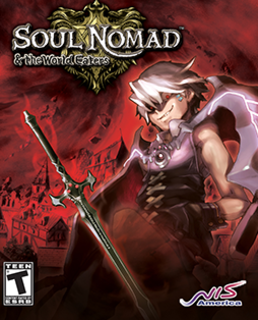A nice mix of Disgaea and Ogrebattle. Just don't judge it too quickly!
So what is the twist? What makes you sink so much time into this game? Well, on a purely superficial level, the plot is one of the best I've encountered in a long time, with twists that I did not foresee coming. The dialogue of Gig is both offensive and ha-larious, and worth listening to just about every time. It blends humor in almost seamlessly without making too much of feel "set up", more like dry wit instead of using something simple like puns. Later, the game begins to take a serious turn, and the humor is used less and less.
Yet again, you have multiple endings and even multiple paths through this game, a good path and a demon path (unlocked after the first play through). Having done both of these paths once, I can say that each one was very rewarding. Although one drawback on the normal path is that after the first play through, the enemies stay the same level the second time through whereas, on the demon path, the enemies are usually in the low 40's to 60's. Make sure you are well leveled when you travel the demon path. Take time to appreciate the evil humor on the "dark side" of the game.
One thing I noticed with the demon path, is how wonderfully complete the storyline is. You still meet the same characters that you meet during your normal play through, but this time they are your enemy (or if they were your enemy, they'll join your side this time). The demon path is incredibly short and bloody compared to the main path and has two unique endings to it, depending on if you win or lose the final battle. Make sure you save before the last battle and lose on purpose just to be able to see them both.
The game play is a bit confusing at first because the tutorial is incredibly spotty at best. It goes over some of the basics, but leaves a lot of the finer points unexplained. For example, the use of Gig-edicts during the story line can net your main character extra cash, more characters, or even alter your stats when you use them on the various citizens you encounter in towns.
So how is this game a mixture of Disgaea and Ogrebattle? Well, it has the character design and humor of Disgaea while the combat is squad based like Ogrebattle. The creation and use of squads creates another aspect of customization to this game, as different combinations of classes will unlock special attacks or "combos." One complaint that has often been brought up is that during combat sequences, you have no control over what characters your units attack (unlike Ogrebattle: March of the Black Queen, which let you choose between weakest, strong, leader, best). Hopefully they will include this feature in future games, if they decide to continue in this vein.
Anyone who has played a game by NIS is familiar with their focus on creating alternative worlds for the purpose of leveling. In Disgaea, it was Item World. In Phantom Brave, it was leveling titles in dungeons. In Soul Nomad, it is "Room Inspection." Inspecting rooms allows for power leveling (something that all NIS games are designed to allow) and creating more powerful units since the room's inherent abilities are modified and improved during the inspection process. However, this is where the game becomes more difficult. During these random battles, mini-bosses for each room are generated, and in order to increase the room's abilities, they must be defeated. However, these mini-bosses are always X -times more powerful than the rooms "normal" denizens, and the more levels you've cleared, the more powerful the boss becomes. For example, during an "Inspection" of a room with a base level of 50+, the mini-boss for the room may be as powerful as level 150 (or even higher). Unfortunately, if your main character is killed during an "Inspection," the game is over, making it a coin flip during some of the more powerful rooms. To get the best results, it is obviously better to chain-clear the rooms, but in doing so you run the risk of encountering too powerful of an enemy and losing a lot of work.
Another complaint is that rooms for units are randomly generated. While this makes sense for lower levels (since you probably don't have the funds to field a 9-man unit), it would be great if you could unlock the ability to buy rooms and designate the number of spaces you wish to purchase. So instead you have to rely on random chance to get the type of room you want with the number of spaces you need, which will be no less than 9 for the main hero's squad, once you've got the ability to get 9 slots. This whole aspect creates a frustrating waste of time, that could and should have been avoided.
Overall, this is a quality game and well worth playing. While the main story line is fairly easy, I marked the difficulty as hard only because the game's more rewarding aspects are only achieved with a great sacrifice of time and leveling. The characters are enjoyable, the story line is fun, and the multiple endings all but guarantee replayability.

